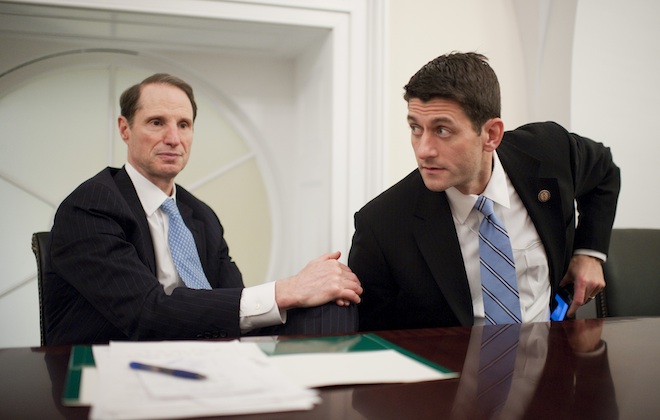An unholy, unexpected political marriage between a Democratic senator and a House Republican firebrand will have implications beyond Capitol Hill — and could conceivably alter both the political tenor of the 2012 elections and the long-term policy fight over the future of Medicare.
Sen. Ron Wyden (D-OR) is teaming up with Paul Ryan, the House’s top budget guy and the author of the GOP’s controversial budget which proposes phasing out traditional Medicare and replacing it with a private plan. The two announced via The Washington Post that they’ll be teaming up on a different version of that Medicare plan — one that closely mimics plans offered by leading GOP presidential candidates Newt Gingrich and Mitt Romney, and a proposal authored by former Sen. Pete Domenici and former Clinton budget director Alice Rivlin, which loomed large in the Super Committee’s failed negotiations.
The move makes Wyden the first elected Democrat to endorse creating a premium-support system to compete with traditional fee-for-service Medicare, and for Ryan represents a de facto admission that his own plan was too radical to ever gain bipartisan support. That’s bound to affect how congressional and presidential candidates approach the issue, which will feature prominently in next year’s elections. But it raises a number of other questions, both about the merits of the policy and of the political calculus behind it.
The policy itself allows insurers to compete with traditional Medicare turning Medicare essentially into a public option on a private insurance exchange. Wyden and Ryan would give patients subsidies that could be applied to either private insurance or fee for service Medicare. It has features of both a “defined contribution” and “defined benefit” program. All plans including Medicare would have to meet a high benefit standard. But if seniors were to choose plans that exceeded a benchmark cost they would be required to pay the difference out of pocket. If Medicare itself were to come in below the benchmark, it would function no differently than Medicare does right now. If it Medicare were to exceed the benchmark, though, seniors would have to pay more out of pocket to enroll in it.
Unlike previous plans, those subsidies would rise and fall with the cost of the plans themselves — not at a fixed rate below the explosive rate of health care inflation. But capping subsidy growth is exactly how Ryan’s original plan cut federal spending so much. This plan relies mostly on the theory that competition among insurers could hold down costs — a proposition with little evidence behind it — and would therefore save the government much less, if any, money at all. If the private plans were to prove popular, traditional Medicare would wither; if they proved popular to younger, healthier seniors, Medicare would end up with a severe adverse selection problem and could begin to unwind (though the plan does feature a so-called “risk adjustment” mechanism to guard against this possibility).
But the two are saving the policy debate for after the election. They don’t plan to introduce legislation until next Congress at the earliest and so the immediate impact of the plan is political.
Ryan’s original plan (which explicitly phased out traditional Medicare) has become the gold standard of conservative entitlement reform, and has dragged GOP presidential primary contestants far to the right on the issue. This plan relaxes that standard, and gives the candidates some breathing room in the general election. Wyden’s blessing doesn’t hurt either (“even liberal Democrat Ron Wyden supports my Medicare plan.”)
And it will be a boon for Mitt Romney. The Wyden-Ryan approach appears to be closer in structure to Romney’s proposal than to Gingrich’s. Romney in recent days has lavished praise on Ryan, who hasn’t backed a candidate yet and is considered one of the most powerful endorsements in the party. Ryan, for his part, has been critical of Gingrich’s political timidity, saying that voters “don’t want to be pandered to like children.”
“This is not the 1990s,” Ryan told the conservative magazine National Review this week. “The ‘Mediscare’ is not working and we should not back down from this fight. I, for one, believe the country is ready, they’re hungry for it.”
This isn’t a happy outcome for Congressional Republicans nearly all of whom voted for Ryan’s much farther-reaching plan.
It’s unclear what if anything Wyden gains politically out of teaming up with Ryan. The move will infuriate other Democrats, all the way up to President Obama, who has been preparing a national campaign that emphasizes — not obscures — the contrast between the parties’ different visions of the social safety net.
Obama and Wyden have clashed before. Wyden’s support for Obama’s health care law was premised in part on the inclusion of something called the Free Choice Act, which would have given employees the choice of foregoing employer-sponsored insurance and receiving instead a voucher to go buy coverage on the individual market in state-based insurance exchanges. The provision survived the bill, drawing the ire of both labor and business trade organizations. But it was smothered in the crib about a year later. Obama traded it away to Republicans during the government shutdown fight. This plan would resuscitate it.









